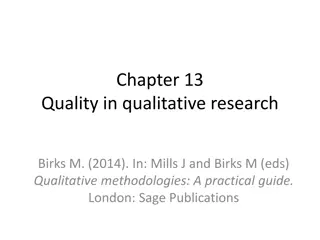Qualitative Research in Education: Key Concepts and Methods
Qualitative research in education, as explained by Dr. Geetha Gopinath, focuses on understanding social phenomena through in-depth exploration of human behavior, attitudes, and motivations. This research method emphasizes interpretation and the participants' viewpoints. Learn about the purpose, characteristics, key elements, types, methods, strengths, limitations, and ethical guidelines of qualitative research to enhance your knowledge and research skills.
Uploaded on Mar 15, 2025 | 1 Views
Download Presentation

Please find below an Image/Link to download the presentation.
The content on the website is provided AS IS for your information and personal use only. It may not be sold, licensed, or shared on other websites without obtaining consent from the author.If you encounter any issues during the download, it is possible that the publisher has removed the file from their server.
You are allowed to download the files provided on this website for personal or commercial use, subject to the condition that they are used lawfully. All files are the property of their respective owners.
The content on the website is provided AS IS for your information and personal use only. It may not be sold, licensed, or shared on other websites without obtaining consent from the author.
E N D
Presentation Transcript
QUALITATIVE RESEARCH QUALITATIVE RESEARCH Dr. GEETHA GOPINATH ASSISTANT PROFESSOR DEPARTMENT OF EDUCATION AND EDUCATIONAL TECHNOLOGY SCHOOL OF SOCIAL SCIENCES UNIVERSITY OF HYDERABAD CENTRAL UNIVERSITY CAMPUS HYDERABAD
CONTENTS CONTENTS Concept of Qualitative Research Purpose of Qualitative Research Characteristics of Qualitative Research Key elements of Qualitative Research Types of qualitative Research Methods of Qualitative Research Strengths of Qualitative Research Limitations of Qualitative Research Ethical guidelines of Qualitative Research
learning OBJECTIVES learning OBJECTIVES Enable the student teachers to, define and explain the concept of qualitative research describe the characteristics of qualitative research list the key components of qualitative research explain different methods of qualitative research enumerate the steps of qualitative research elucidate different types of qualitative research analyze the strengths and limitations of qualitative research
What is qualitative research? What is qualitative research? Qualitative research is a process of real-life inquiry that aims to understand social phenomena. It focuses on the "why" and how rather than the "what" of social phenomena It is a scientific research method used to gather non-numerical data. Qualitative research is used to gain an in-depth understanding of human behaviour, experience, attitudes, intention and motivations. It aims to find out the way people think and feel on the basis of observation and interpretation It is a form of research in which the researcher gives more weightage to the views of the participants
definitions definitions Creswell (2009) has defined qualitative research as, Qualitative research is an inquiry process of understanding based on distinct methodological traditions of inquiry that explore a social or human problem. The researcher builds a complex, holistic picture, analyzes words, reports detailed views of informants and conducts the study in a natural setting . According to Denzin and Lincoln (1994) a qualitative research focuses on interpretation of phenomena in their natural settings to make sense in terms of the meanings people bring to these settings .
Purpose of qualitative research Purpose of qualitative research Reveals nature of certain situations, settings ,processes and relationships Description Enable researcher to gain new insights about a phenomenon and develop new theoretical background of the issue Interpretation Allow researcher to test the validity of certain assumptions, theories and claim within real-world contexts Verification Provide a means which a researcher can evaluate effectiveness of a particular finding or innovation Evaluation
Characteristics of Qualitative Research Characteristics of Qualitative Research Qualitative research is conducted in natural settings to get real information. The Qualitative research is holistic in nature-study the problem from all angles The qualitative research follows a subjective approach as the researcher is intimately involved Qualitative research is exploratory.It is conducted to have a better understanding of the existing problem, Qualitative research is flexible. It can change at any stage of the research and based on the change, the course of research might also get changed.
Characteristics of Qualitative Research Characteristics of Qualitative Research The reasoning used to synthesise data in qualitative research is inductive Researcher participates in the research and engages the participants in the study. Qualitative research is based on purposive sampling A thorough understanding of the target concept. small sample size is selected with a view to get a
Characteristics of Qualitative Research Characteristics of Qualitative Research Verbal data are collected in qualitative research. Inquiry in qualitative research is process-oriented Elements used in the analysis of qualitative research are words, pictures, and objects The methods used in qualitative research are in-depth interviews, focus groups,observation, analysis of documents, records, reports, and artifacts, etc.
KEY elements OF qualitative research KEY elements OF qualitative research Naturalistic -- refers to studying real-world situations as they unfold naturally; non-manipulative and non-controlling; the researcher is open to whatever emerges [i.e., there is a lack of predetermined constraints on findings]. Emergent -- acceptance of adapting inquiry as understanding deepens and/or situations change; the researcher avoids rigid designs that eliminate responding to opportunities to pursue new paths of discovery as they emerge. Purposeful -- cases for study [e.g., people, organizations, communities, cultures, events, critical incidences] are selected because they are information rich and illuminative. That is, they offer useful manifestations of the phenomenon of interest; sampling is aimed at insight about the phenomenon, not empirical generalization derived from a sample and applied to a population.
Types of qualitative research Types of qualitative research The six Types of Qualitative research are Phenomenological model, Ethnographic model, Grounded theory, Case study, Historical model Narrative model.
METHODS USED IN QUALITATIVE RESEARCH METHODS USED IN QUALITATIVE RESEARCH Qualitative researchers use their own eyes, ears, and intelligence to collect in-depth perceptions and descriptions of targeted populations, places, and events . Their findings are collected through a variety of methods, and often a researcher will use at least two or several of the following while conducting a qualitative study: Direct observation: researcher studies people as they go about their daily lives without participating or interfering. This type of research is often unknown to those under study, and as such, must be conducted in public settings where people do not have a reasonable expectation of privacy. For example, a researcher might observe the ways in which strangers interact in public as they gather to watch a street performer.
METHODS USED IN QUALITATIVE RESEARCH METHODS USED IN QUALITATIVE RESEARCH Open-ended surveys: While many surveys are designed to generate quantitative data, many are also designed with open-ended questions that allow for the generation and analysis of qualitative data. For example, a survey might be used to investigate not just which political candidates voters chose, but why they chose them, in their own words. Focus group: In a focus group, a researcher engages a small group of participants in a conversation designed to generate data relevant to the research question. Focus groups can contain anywhere from 5 to 15 participants. Social scientists often use them in studies that examine an event or trend that occurs within a specific community. They are common in market research, too.
METHODS USED IN QUALITATIVE RESEARCH METHODS USED IN QUALITATIVE RESEARCH In-depth interviews: Researchers conduct in-depth interviews by speaking with participants in a one-on-one setting. Sometimes a researcher approaches the interview with a predetermined list of questions or topics for discussion but allows the conversation to evolve based on how the participant responds. Other times, the researcher has identified certain topics of interest but does not have a formal guide for the conversation, but allows the participant to guide it. Oral history: The oral history method is used to create a historical account of an event, group, or community, and typically involves a series of in- depth interviews conducted with one or multiple participants over an extended period.
METHODS USED IN QUALITATIVE RESEARCH METHODS USED IN QUALITATIVE RESEARCH Participant observation: This method is similar to observation, however with this one, the researcher also participates in the action or events to not only observe others but to gain the first-hand experience in the setting. Ethnographic observation: Ethnographic observation is the most intensive and in-depth observational method. The researcher fully immerses themselves into the research setting and lives among the participants as one of them for anywhere from months to years. Content analysis: This method is used by sociologists to analyze social life by interpreting words and images from documents, film, art, music, and other cultural products and media. The researchers look at how the words and images are used, and the context in which they are used to draw inferences about the underlying culture.
Steps of qualitative research Steps of qualitative research Identifying a research problem/stating the problem Reviewing the literature Specifying a purpose and research questions Collecting the data Analyzing the data Determining the quality of data Reporting the research
strengths of qualitative research strengths of qualitative research Obtain a more realistic view of the lived world that cannot be understood or experienced in numerical data and statistical analysis Provide the researcher with the perspective of the participants of the study through immersion in a culture or situation and as a result of direct interaction with them Allow the researcher to describe existing phenomena and current situations Develop flexible ways to perform data collection, subsequent analysis, and interpretation of collected information Yield results that can be helpful in pioneering new ways of understanding
Respond to changes that occur while conducting the study [e.g., extended fieldwork or observation] and offer the flexibility to shift the focus of the research as a result Provide a holistic view of the phenomena under investigation Respond to local situations, conditions, and needs of participants Interact with the research subjects in their own language and on their own terms Create a descriptive capability based on primary and unstructured data.
Limitations of qualitative research Limitations of qualitative research The quality of the data gathered in qualitative research is highly subjective. Mining data gathered by qualitative research can be time consuming. Qualitative research creates findings that are valuable, but Qualitative research is not statistically representative. .Research using human subjects increases the chance of ethical dilemmas that undermine the overall validity of the study An inability to investigate causality between different research phenomena Replication of a study is very difficult
Ethical guidelines of qualitative research Ethical guidelines of qualitative research Research participants should not be subjected to harm in any ways Respect for the dignity of research participants should be prioritized Full consent should be obtained from the participants prior to the study The protection of the privacy of research participants has to be ensured Adequate level of confidentiality of the research data should be ensured
Ethical guidelines of qualitative research Ethical guidelines of qualitative research Anonymity of individuals and organizations participating in the research has to be ensured Any deception or exaggeration about the aims and objectives of the research must be avoided. Any type of communication in relation to the research should be done with honesty and transparency. Any type of misleading information, as well as representation of primary data findings in a biased way must be avoided
Summary Qualitative research is a process of real-life inquiry that aims to understand social phenomena. It focuses on the "why" and how rather than the "what" of social phenomena .It is a scientific research method used to gather non-numerical data and is used to gain an in-depth understanding of human behaviour, experience, attitudes, intention and motivations
Suggested readings Creswell, J. W. (2018). Qualitative Inquiry and Research Design: Choosing Among Five Traditions. Thousand Oaks, CA: SAGE publications Denzin,N.K.,&Lincoln,Y.S.(1994).Handbook of Qualitative Research. Thousand Oaks, CA: Sage Publications Neuman, W. L. (1994). Social Research Method: Qualitative and Quantitative Approaches (2nd ed.). Bostin: Allyn & Bacon. Kothari,C.R. (2008). Research Methodology Methods and Techniques (second revised edition), New Delhi: New Age International. McMillan, J. H. & Schumacher, S. (1993). Research in Education: A Conceptual Understanding. New York: Haper&Collins.























